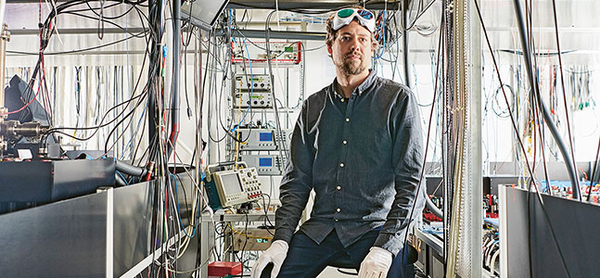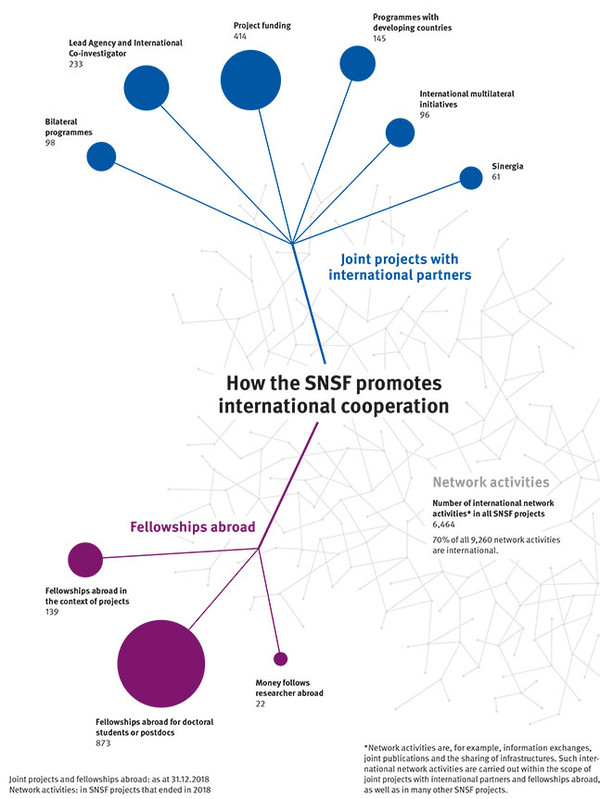Successful cross-border collaboration

Swiss science is in a leading position thanks to its strong outreach in Europe and the world. At year-end 2018, the SNSF was funding 2,000 international projects and fellowships abroad.
When Daniel Kienzler returned to Switzerland in August 2017 after his research stay in Boulder, Colorado, he brought a full rucksack with him. “While I was working as a postdoc in the USA, I broadened my scientific horizons by forging important links with researchers,” the 35-year-old physicist is happy to report. “And I developed ideas for future projects.” Daniel Kienzler was researching quantum logic operations at the National Institute of Standards and Technology. Operations of this kind are essential in creating quantum computers. One of the aims of his project was to get two quantum bits, or qubits – the units of information with which quantum computers work – to perform operations together without them ever being linked. Doing so will make it possible to build larger quantum computers suitable for practical applications. His visit in Boulder was largely financed by an SNSF fellowship.
Essential for top-flight research
“Internationality is crucial to Swiss research,” says Jean-Luc Barras, head of the SNSF’s International Co-operation division. “In today’s world, top-flight research is only possible if there is ongoing dialogue with partners in other countries.” The SNSF has therefore been promoting international cooperation for a long time. It supports joint projects by researchers in Switzerland and abroad. It takes part in multinational programmes and in European joint programmes. It enables researchers to spend time abroad by awarding fellowships to doctoral students and postdocs like Daniel Kienzler. At the end of 2018, the SNSF was funding 2,000 international projects and fellowships. In a large number of other projects, researchers maintain a dialogue with colleagues abroad. At year-end 2018, over 6,000 different network activities were taking place in SNSF projects.
International expertise
The SNSF also promotes internationality through its selection procedure, under which the vast majority of applications for financing are reviewed by experts from other countries. Furthermore, the National Research Council and its evaluation commissions have an international membership. Having this outside perspective gives Swiss research extra momentum and speeds up its development.

28%
of the newly approved projects in the SNSF’s Project funding scheme involve research partners abroad (2018)
65%
of all network activities in SNSF-funded projects are with the European Union (2011–2018)
“Thanks to SNSF funding, thousands of Swiss scientists have networks in Europe and throughout the world,” says Jean-Luc Barras. “That enables them to incorporate the latest findings and trends into their projects and deliver high-quality research.” The SNSF thus makes a key contribution to maintaining Switzerland’s leading position in scientific research – which is one of the goals of the new international education, research and innovation strategy adopted by the Federal Council in 2018.
Strengthening dialogue
The SNSF also revised its international strategy during 2018. Its aim is to facilitate greater idea and knowledge sharing at global level wherever it makes sense to do so, and to further intensify its efforts in support of academic freedom. “This will increase research capacity both at home and abroad,” says Jean-Luc Barras. The strategy also sets out principles. Scientific quality is the primary criterion that the SNSF applies when deciding whether to finance an international project. Partner organisations have to operate a peer review system and comply with high ethical standards. Project results and data will be freely accessible. The SNSF is particularly keen to support cooperation with research groups from several countries.
Key impetus
The fellowship that Daniel Kienzler received was key in bringing fresh impetus to his scientific career. His new project has passed the SNSF’s strict selection procedure and been awarded one of the coveted Ambizione grants. Since November 2018, Kienzler – assisted by a doctoral student – has been setting up an experiment to inspect and survey hydrogen molecules using quantum logic methods at ETH Zurich. In the course of his work, he exchanges information with researchers in Switzerland, Germany, France, the United Kingdom and USA.“This project would never have happened if I hadn’t gone to Boulder.”
From abroad to Switzerland
Researchers in other countries can also apply for SNSF funding if they plan to carry out their project in Switzerland or are employed by a Swiss research institution. In addition, foreign project partners are given the opportunity to spend some time working in Switzerland. Universities and research centres such as PSI or CERN benefit from these researchers. Finally, the SNSF can support fellowship recipients for a period of three to twelve months following their return to Switzerland.
The new programme SPIRIT
In early 2019, the SNSF launched SPIRIT, the Swiss Programme for International Research by Scientific Investigation Teams. The programme aims to strengthen networks with low and middleincome countries. Funding is awarded to original, teamoriented projects in all disciplines submitted by teams from two to four countries. Through the project, the SNSF is contributing to the education of young researchers and helping to promote equal opportunities. Each year, it will finance up to 12 projects lasting a maximum of four years and costing 500,000 francs.